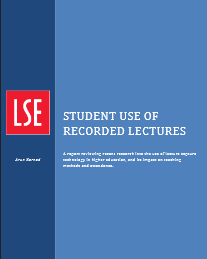Reading: “Student use of recorded lectures”
 I am always on the lookout for resources and research that supports (or not – never let it be say that I’m not open minded) the use of an appropriate and considered implementation of lecture capture. So I was very pleased when I saw a tweet highlighting this research from London School of Economics (LSE):
I am always on the lookout for resources and research that supports (or not – never let it be say that I’m not open minded) the use of an appropriate and considered implementation of lecture capture. So I was very pleased when I saw a tweet highlighting this research from London School of Economics (LSE):
Karnad, Arun (2013) Student use of recorded lectures: a report reviewing recent research into the use of lecture capture technology in higher education, and its impact on teaching methods and attendance. London School of Economics and Political Science, London, UK. Available online: http://eprints.lse.ac.uk/50929/ [Accessed 28 June, 2013]
What I have taken from this is highlighted in the conclusion – it is as much about the signposting and implementation of the technology as the way the individual(s) use it. Whist some will use it as an excuse to skip lectures (isn’t that their choice?) others will use it as a resource as we intended it … for learning, reflection, growth, the ‘student experience’, etc.:
“The papers reviewed in this report, whilst using various measurement parameters and studying different groups of students studying a variety of courses, have reached some common conclusions on the question of student use of recorded lectures and its effect on attendance. The majority of these papers concluded that students liked having access to recorded lectures, and mainly used them to make up for missed lectures, and to review lectures in order to prepare for assessments … Students in most studies also preferred access to live lectures, with most preferring a blended format incorporating lecture recordings, live lectures, course materials and additional classes. Studies have suggested that lecture capture may also be a helpful tool for students with learning disabilities and NESB students.”
The conclusion continues by saying that the
“perception that access to recorded lectures lowered student attainment has also been disputed by most of the papers considered in this review with lecture recordings having a slightly positive, or negligible effect on student attainment, and even a rise in student grades and lecture attendance in some cases. This may be due to the strategic manner in which students use lecture recordings to reinforce their understanding of lecture materials, rather than viewing recordings as a replacement for attending lectures.”
“Therefore whilst lecture capture technology offers many benefits and pitfalls, its current role in higher education remains a supportive one in relation to live lectures, which are yet valued higher by students than their recorded equivalents.”
What do you you think? Are you in favour or against lecture capture, and why? What is you your experience with it, good or bad?


















For campus-based courses….on the whole, there are two ways in which it is used: to re-inforce the learning made from being at the lecture and to replace the learning made at the lecture. I have no issue at all with students asking to record my lectures for their own use as ‘memmory aids’, but a little concern by students who feel they don’t need to turn up, as they can listen to the lecture at another time. I think that if you allow/encourage/provide lecture capture, it should be alongside some form of reliable attendance records.
Hi Ed – I totally agree with you. The point I make to any one who will listen to me about lecture capture is that it should be made part of the strategy for learning, not just bolted on to the side/end of it. Plan the lectures *and* recordings for the duration of the course, integrate them into activities and/or reading, and make it something that students need.
The base level of use for the technology is to record a lecture and provide the link to the recording. Nothing more, nothing less. But by using the technology wisely this can be enhanced with the use of a prerecording, revision activity based around the recording, extra recordings to supplement topics you don’t have time to cover, etc.
There is scope for many different types of use of the recorded material so, for me, lecture capture should not be dismissed so lightly.
All the best, David
Hi Ed and David
As far as I can tell, most of the evidence seems to point towards students using recordings to consolidate their learning in lectures rather than replacing it. For example, knowing they can access the recording for detailed note taking later means they can concentrate on the substance of the ‘live’ session rather than rushing to get stuff down.
Playing devil’s advocate, Ed (and truly I am), so what if they do skip lectures, as David points out? At £9000 per year, they’ll be getting poor value for money which would be their own fault.
What’s easy (and relatively cheap) now is the technology, whether for full automated lecture capture or an audio/screencast version. Perhaps we’ll reach the point soon of ‘how can we not do it’.
The use of audio management software eg. AudioNotetaker (http://www.sonocent.com/en/audio_notetaker) that allows the incorporation/synchronisation of speaker-support material, a text field for personal annotations, the facility to create new (ie. edited) files and playback at higher speed, can also be a boon to efficient use/reuse of lecture/seminar-based teaching